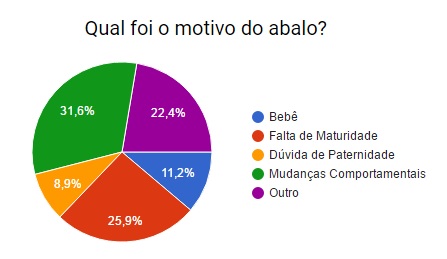![]()
Associated with family unity and happy parents, pregnancy can also cause turmoil in the relationship between future parents, with serious consequences. A Famivita study reveals the overall scope of the problem in Brazil and, in particular, the issue of paternal abandonment1. As a rarely discussed topic, this situation directly and indirectly affects more than 60% of the population.
Main Reasons for Turmoil and Paternal Abandonment
Among the 1,038 women interviewed, 4% reported experiencing some kind of relationship turmoil with the father during pregnancy. Not all disagreements are necessarily caused by the pregnancy itself, but they are related to it. 32% are connected to behavioral changes, either from the pregnant woman or her partner. In this context, the lack of maturity of parents is cited by 26% as another main reason. In 11% of cases, the baby itself is the cause of turmoil, and in 9% of cases, there is doubt from the father about the baby’s paternity.
In some cases, there is already a predisposition for turmoil to happen. Almost a quarter of relationships shaken during pregnancy had already experienced serious previous hardships, and the pregnancy was also seen as an attempt to save the relationship. In half of these relationships, the father actually abandons the mother while she is still pregnant.
This number is slightly higher than the 45% of pregnant women who are left, at least temporarily, following turmoil, meaning 20% of the female population end up being abandoned. While 39% of fathers return to their partner before the baby’s birth, 36% do not acknowledge paternity, not even after the baby is born. The remainder recognize their child after birth.
Requests and Considerations for Abortion
In tense situations and moments of extreme thinking, the idea and need for an abortion is considered, in many cases because the baby appears to be the root of the problem. As a result, 36% of men ask their partner to terminate the pregnancy. In nearly half of these cases, the pregnant woman also considers abortion at the same time. On top of that, another 17% of abandoned women consider abortion independently of the father. There is no data on actual abortions performed as a result of paternal abandonment. The reasons for considering this extreme measure include family, financial, and psychological pressures among others2.
Consequences of Abandonment
It’s not hard to find strong women fighting, educating, and raising their children alone. More than 20 million Brazilian women raise their children without the presence of the father, according to a study by the Data Popular Institute. The vast majority of Brazilian women are not only aware of this reality, but actually recognize paternal abandonment as one of its causes. 57% of women know of abandonment affecting friends and relatives, in addition to the 7% who were abandoned themselves with no similar occurrences nearby. For 88% of those interviewed, the problem is related to the father’s lack of maturity and character.
Paternal abandonment is a growing international problem. According to statistics from the United States, about 24 million children have been abandoned by their fathers—one in every three born. In Brazil, according to the Association of Civil Registry Officials (Arpen-SP), out of every 20 children born in the State of São Paulo, one does not even receive the father’s name on their birth certificate. Complementing the research conducted in the United States, it was revealed that a high proportion of social problems are linked to paternal abandonment and the absence of a male role model in the child’s life. This increases the likelihood of children exhibiting aggressive behavior later in life by four times, for example.
In Brazil, a survey by Datafolha points out that 70% of young offenders held at Fundação Casa (formerly FEBEM) had no relationship with a father figure3. These numbers confirm that children who grow up without the physical presence of a father suffer damage in their psychological development and are more likely to enter the world of crime, suffer emotional problems, become users of drugs and alcohol, and drop out of school early.
Source: http://destrave.cancaonova.com/as-tristes-consequencias-da-ausencia-paterna/













